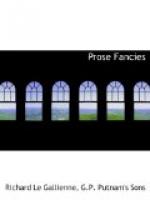Yes, I had once again forgotten Jupiter. How many hundred times was he bigger than the earth? Never mind, there he was, bright as crystal, for me to measure my importance against! The street-lamps did their best, I observed, to brave it out, and the electric lights in Holborn seemed certainly to have the best of it—as cheap jewellery is gaudiest in its glitter. One could much more easily believe that all these hansoms with their jewelled eyes, these pretty, saucily frocked women with theirs, this busy glittering milky way of human life was the enduring, and those dimmed uncertain points up yonder but the reflections of human gas-lights.
A city clerk, with shining evening hat, went by, his sweetheart on his arm. They were wending gaily to the theatre, without a thought of all the happy people who had done the same long ago—hasting down the self-same street, to the self-same theatre, with the very same sweet talk—all long since mouldering in their graves. I felt I ought to rush up and shake them, take them into a bystreet, turn their eyes upon Jupiter, and tell them they must die; but I thought it might spoil the play for them.
Besides, there were so many hundreds in the streets I should have to address in the same way: formidable people, too, clad in respectability as in a coat of mail. The pompous policeman yonder: I longed to go and say to him that there had been policemen before; that he was only the ephemeral example of a world-old type, and needn’t take himself so seriously. It was an irresistible temptation to ask him: ’Canst thou bind the sweet influences of Pleiades, or loose the bands of Orion? Canst thou bring forth Mazzaroth in his season? Or canst thou guide Arcturus with his sons?’ But I forbore, and just then, glancing into an oyster shop, I was fascinated by the oysterman. He was rapidly opening a dozen for a new customer, and wore the while the solemnest face I ever saw. Oysters were so evidently, so pathetically, all the world to him. All his surroundings suggested oysters, legends of their prices and qualities made the art on his walls, printed price-lists on his counter made his literature, the prospects and rivalries of trade made his politics: oysters were, in fact, his raison d’etre. His associations from boyhood had been oysters, I felt certain that his relatives, even his ancestors, must be oysters, too; and that if he had any idea of a supreme being, it must take the form of an oyster. Indeed, a sort




